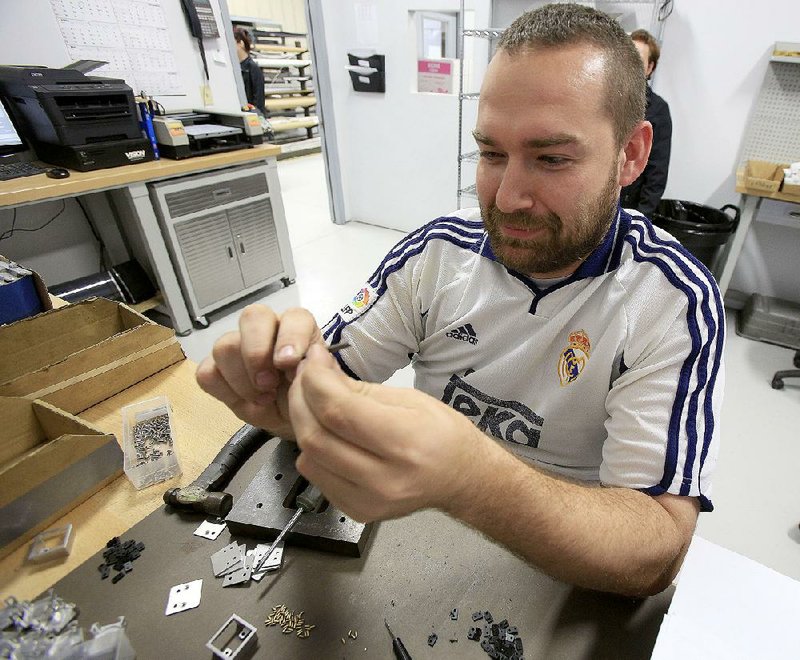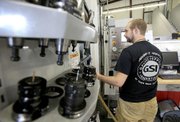WASHINGTON -- When Galley Support Innovations had a client in Brazil, Lissa Zimmerman had to decipher 7,000 pages of rules and regulations. When shipping to a client in India, Zimmerman had to negotiate an entirely different set of rules.
"There is no [universal] set standard, so I then have to kind of become an expert, and I don't want to become an expert," said Zimmerman, the company's director of business relations. "The regulations are crushing."
The 27-person business in Sherwood that makes latches, restraints and handles for private, military and commercial planes is hoping trade deals being negotiated by the U.S. government will streamline the process and set standard rules for how American businesses in nearly a dozen countries are treated.
On Thursday, leaders of the U.S. House and Senate finance committees agreed on legislation that would grant President Barack Obama trade-promotion authority, commonly referred to as fast-track.
If given the authority, the executive branch could complete negotiations on one of the largest trade pacts in the nation's history, the Trans-Pacific Partnership. In negotiations since 2008, it would set rules for trade among the United States and 11 countries, including Australia, Canada, Japan, Mexico and Vietnam.
Past presidents have been granted this authority, although it expired during George W. Bush's administration. Bill Clinton's administration used fast-track authority to approve the North American Free Trade Agreement, or NAFTA, which was signed in 1993.
Arkansas agriculture and business interests are among those pushing for the fast-track authority. Labor groups and many Democrats are worried that the final trade deal won't include enough protections for workers.
Under the compromise legislation announced late last week, as long as the final deal meets certain labor, environmental and human-rights conditions set by Congress, lawmakers would not be able to amend the Obama-negotiated trade deal. Instead, they would vote either for the deal or against it, and could not filibuster. Also, under the compromise legislation, the proposed trade deal would have to be made public for up to four months before Congress votes on it or 60 days before the president signs it.
U.S. Trade Representative Michael Froman said that with the trade deal, American businesses face an uneven playing field in some places abroad where business is booming.
"Lots of other countries are making trade agreements with each other, and they're getting preferential access to these fast-growing markets," Froman said. "We want to be part of that, and we want to be the one helping to define the rules of the road. Then, they'll play to our interests and our values rather than ceding that role to China or anybody else."
According to a report released this month by the U.S. Trade Representative's office, the United States exported $2.3 trillion worth of goods in 2014. Of that, $727 billion went to countries now included in the Trans-Pacific Partnership negotiations.
In Arkansas, $3 billion of the state's $6.9 billion in goods exported in 2014 went to countries included in the Trans-Pacific Partnership, according to the report.
Labor and environmental groups say the deal should be publicly negotiated and that members of Congress should be able to make changes to it. Several hundred workers from various labor organizations rallied for two hours on Capitol Hill on Wednesday with several Democratic lawmakers before meeting with other members of Congress.
AFL-CIO Executive Vice President Tefere Gebre said it takes 60 votes in the Senate to increase the minimum wage, fix infrastructure and extend unemployment insurance, "but they are saying with a simple vote, a simple majority, they want to pass the biggest trade deal this country has ever seen."
He said labor unions are leery because they remember companies closing factories and moving overseas after NAFTA went into effect.
"It has not worked, and we're not going to fall for the same lies again," Gebre said. "They are desperate to pass this thing, and we have to be desperate in fighting back."
By phone Froman said the deal will include labor and environmental protections far above what was in NAFTA. Among them are strengthening the right to collective bargaining, toughening the prohibition on child labor, mandating higher minimum wages and requiring safer workplace conditions at factories overseas.
He said the U.S. has 11.7 million export-related jobs.
"With 95 percent of the globe's consumers living outside the United States, the only way we're going to get back to full employment and support the kind of well-paying jobs that we all want to see here is by making sure we're taking advantage of all these opportunities abroad," Froman said.
U.S. Sen. John Boozman, R-Ark., sat down with Arkansas Steel Workers representatives Wednesday after the rally. His spokesman said Boozman's office has received about 100 emails and letters on the topic, with supporters and opponents of the legislation fairly evenly split.
Boozman said he supports giving Obama the authority.
"The reality is the only way to get these trade agreements worked out where you have fair trade versus free trade ... is through trade promotion authority and giving the administration the power to step in and work a viable agreement with the input of Congress," he said. "If a deal is struck that simply Congress doesn't like, then they can vote it down."
The rest of Arkansas' congressional delegation has also received comments from Arkansans on both sides, their spokesmen said last week. Several lawmakers said they would be more comfortable with granting the authority if it set parameters for what can and cannot be in the final deal.
In a statement, U.S. Rep. Rick Crawford, R-Ark., said trade promotion authority "is an essential tool for enabling the executive branch to negotiate and ink trade agreements. However, I don't believe that [the authority] should have no strings attached. It must include directives that ensure the Administration negotiates in good faith on behalf of Congress and American workers."
The final Trans-Pacific Partnership deal will be the first to specifically include a section with protections for small businesses, Froman said.
"One thing that we are very much focused on is how to make sure small and medium-sized businesses are able to engage globally and take advantage of these opportunities," Froman said.
The U.S. Trade Representative's report also found that 79 percent of the 2,264 Arkansas companies exporting in 2013 had fewer than 500 workers.
Froman said owners of small and medium-sized businesses tell him that they are worried about tariffs, burdensome customs procedures and having open access to the Internet, all of which will be addressed in the final agreement.
"Many small businesses engage globally through the Internet. They don't necessarily set up offices all around the world," he said.
In Sherwood, Zimmerman pulled several fist-sized items that the company makes from a glass display case in the lobby. She said operating a niche market means the 50-year-old company has to constantly look for new customers and new markets.
Among items the company makes is locks.
"You fly on a Boeing, you go to the bathroom, use the lock, and you've used one of our locks," Zimmerman said. "You fly on a Gulfstream sometime? You'll use our locks. We're about one of four companies in the world who really do what we do specifically."
Zimmerman said the company hires logistics experts, lawyers and people around the world to help handle the differing rules in each country.
Two years ago, Galley Support Innovations tried on its own to handle a shipment to India, and ended up facing delays and problems. Indian authorities eventually demanded that someone from the company go pick up the shipment in person, she said, prompting frantic calls to the Commerce Department, Trade Commission and embassies. The nearly month-long delay meant that the customer could charge the company a fine because of late delivery.
"It was an 18-month process of getting fees, fine, duties everything, payments back and forth," she said. "It was a big process, and it was a lot of manpower [that as] a small company we can't afford."
For Galley Support Innovations, new trade deals mean the company can focus on expanding business and finding new customers, rather than on complying with myriad rules and regulations, Zimmerman said.
"It's going to give some commonality and a set standard in some cases. It's going to eliminate some of the paperwork and some of the need to jump through hoops," Zimmerman said.
SundayMonday on 04/19/2015

